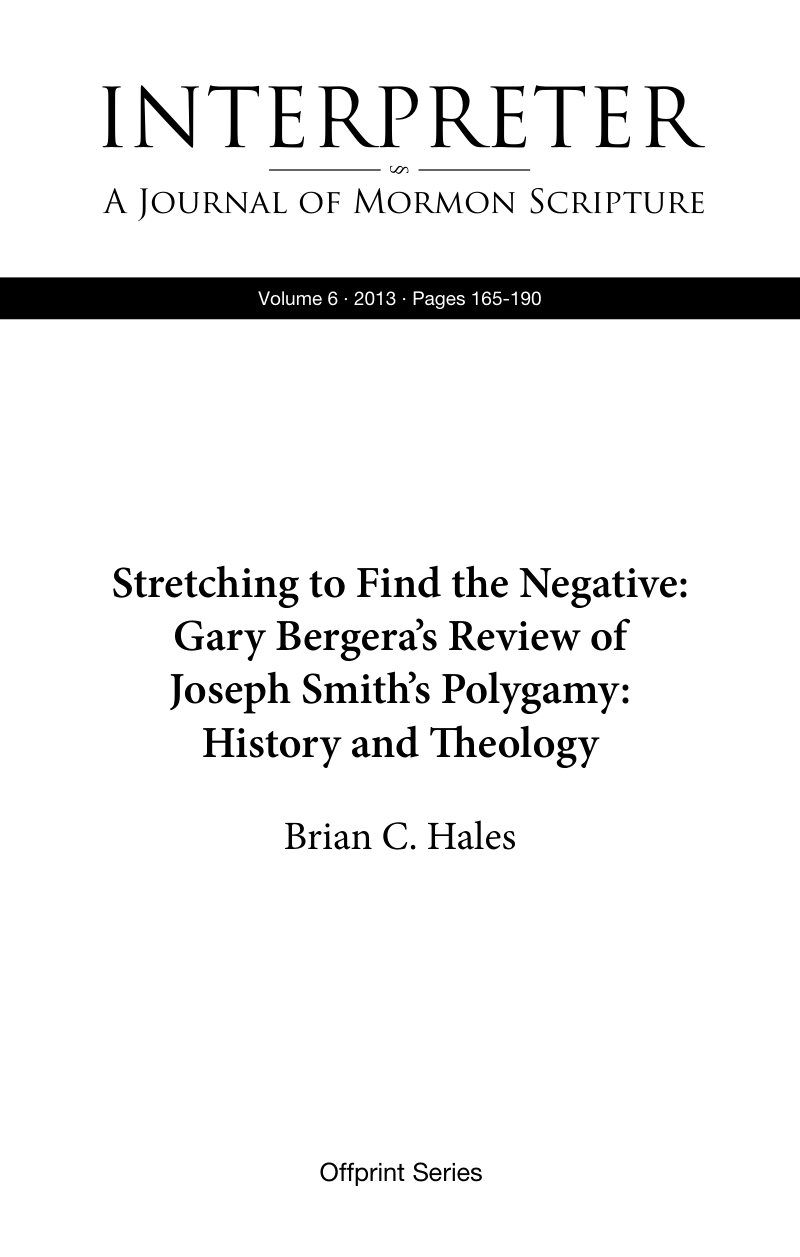Brian C. Hales summarizes Joseph's marriage proposal to Lucy Walker, disputes that he was coercive or forced her to marry him.
- Type
- Academic / Technical Report
- Hearsay
- Secondary
- Reference
Brian C. Hales, "Stretching to Find the Negative: Gary Bergera’s Review of Joseph Smith’s Polygamy: History and Theology," Interpreter: A Journal of Latter-day Saint Faith and Scholarship 6 (2013): 184–188
- Scribe/Publisher
- Interpreter: A Journal of Latter-day Saint Faith and Scholarship
- Audience
- Reading Public
- Transcription
No Evidence that Joseph Smith Forced Any Woman to Marry Him
Stories that Joseph Smith forced women to marry him are sometimes repeated in antagonistic literature, but they are not supported by available historical evidences. One popular anti-Mormon narrative recounts how Joseph Smith met a woman and gave her 24 hours to comply or she would be cut off forever.41 The story is folklore, but it is based upon the introduction of the previously unmarried Lucy Walker to plural marriage.
Joseph introduced the principle to Lucy in 1842. She did not accept, but she agonized for many months as he patiently waited. She related: “I was tempted and tortured beyond endurance until life was not desirable. Oh that the grave would kindly receive me, that I might find rest…. Oh, let this bitter cup pass. And thus I prayed in the agony of my soul. The Prophet discerned my sorrow. He saw how unhappy I was….”42 Finally, on April 30, 1843, Joseph saw her anguish and spoke to her, pushing her to resolution: “I have no flattering words to offer. It is a command of God to you. I will give you until tomorrow to decide this matter. If you reject this message the gate will be closed forever against you.” How did Lucy respond to this challenge? Not as cynical writers have portrayed Nauvoo polygamists in their narratives, as gullible dupes who lacked the fortitude to reject the charismatic Joseph. Instead, she responded as skeptics would today:
This aroused every drop of Scotch in my veins. For a few moments I stood fearless before him, and looked him in the eye…. I had been speechless, but at last found utterance and said: “Although you are a prophet of God you could not induce me to take a step of so great importance, unless I knew that God approved my course. I would rather die. I have tried to pray but received no comfort, no light,” and emphatically forbid him speaking again to me on this subject. Every feeling of my soul revolted against it.43
Lucy called his bluff. She had the same questions that observers voice today. Then she demanded a divine manifestation from the same source Joseph said he had received the commandment to practice plural marriage:
Said I, “The same God who has sent this message is the Being I have worshipped from my early childhood and He must manifest His will to me.” He walked across the room, returned and stood before me with the most beautiful expression of countenance, and said: “God Almighty bless you. You shall have a manifestation of the will of God concerning you; a testimony that you can never deny. I will tell you what it shall be. It shall be that joy and peace that you never knew.”44
She related how Joseph’s promise was fulfilled shortly thereafter:
One night after supper I went out into the orchard and I kneeled down and prayed to God for information. After praying I arose and walked around the orchard and kneeled again and repeated this during the night. Finally as I was praying the last time, an angel of the Lord appeared to me and told me that the principle was of God and for me to accept it.45
Another common behavior attributed to Joseph Smith, but is not documentable, involves John C. Bennett’s claim that Joseph would destroy the reputation of any woman who turned him down.46 We know of five women who refused the Prophet’s plural proposals.47 After each one he exerted no force and told no one. The only reason we know of those proposals is because each woman (or one of her relatives) related it later. Sarah Kimball was one of the five women – her husband being a nonmember. She later related:
I asked him to teach it to some one else. He looked at me reprovingly and said, “Will you tell me who to teach it to? God required me to teach it to you, and leave you with the responsibility of believing or disbelieving.” He said, “I will not cease to pray for you, and if you will seek unto God in prayer, you will not be led into temptation.”48
It is true that Sarah Pratt and Nancy Rigdon accused Joseph Smith of impropriety, and he aggressively defended himself against their allegations. However, his interactions with the five other women indicate that if Pratt and Rigdon had remained silent, he too would have quietly left them “with the responsibility of believing or disbelieving.”
In summary, to simply state Joseph may have practiced sexual polyandry to hide paternity fails to address the multiple complexities of the marital processes as discussed above and in my chapters (11-16) in Volume 1. Furthermore, multiple observations and evidences support that such relations did not occur and would have been considered to be adultery by the Prophet. Polyandrous wives chose Joseph as their eternal husbands for reasons that are unclear, but there is no credible evidence that he forced any woman to marry him polyandrously or otherwise.
- Citations in Mormonr Qnas
The B. H. Roberts Foundation is not owned by, operated by, or affiliated with the Church of Jesus Christ of Latter-day Saints.

